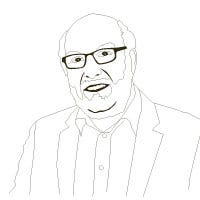Psychosomatics: the body as the soul’s warning system
When everything gets on top of us, it’s not only our mental well-being that suffers – Our body often goes haywire, and we need to start looking for the root cause.

If a person is subject to constant pressure at work, stress at home, and general worries and anxieties, the body may suddenly throw the towel in, too. Human beings are complex creatures. Nowhere is this more evident than in psychosomatics, where our knowledge of body and mind combine in a single area of expertise. Facts show that this field is needed to untangle the complex web of interactions, with up to 80% of people experiencing how psychological stress affects their physical health at least once in the course of their lives. For example, their heart starts to race, their blood pressure shoots up, their back aches or their skin shows something is wrong by coming out in a rash. But a visit to the doctor shows that their heart is actually OK, the intervertebral discs are in the right place, and the allergy tests come back negative. What is going on?
Psychomatic medicine: what does that mean?
«Zeitlich beschränkte Belastungen kann der Mensch körperlich und psychisch gut bewältigen», erklärt Ulrich T. Egle, Professor für Psychosomatische Medizin und Psychotherapie im Sanatorium Kilchberg, «anhaltende jedoch nicht.» Lässt der Stress nicht mehr nach, führt dies im Blut zu einem dauerhaft hohen Wert des Stresshormons Cortisol. “Cortisol in turn can damage certain areas of the brain”, says Egle. The areas responsible for processing stress come under the biggest strain. Our body’s self-regulation, which normally helps us relax after peaks in stress levels, is thrown off kilter. This can cause psychosomatic disorders. The result: you become psychomatically ill.
Perfectionists and anxious people are affected more often
Perfectionists and people who push themselves too hard are more susceptible to this. Also at risk are people who are afraid to try new things or who find it hard to deal with uncertainty. For Egle, the key factor is how a person copes with stress and how they evaluate challenging situations. “Our coping patterns are shaped by previous learning and life experiences. Sie dienen dazu, auf neue Situationen und Herausforderungen bestmöglich vorbereitet zu sein.» Diese Muster können lange effizient sein, auf Dauer aber dennoch zu einer Belastungsstörung führen. Ideally, our brain should be able to handle stressful situations while using as little energy as possible.
Insight-oriented psychotherapy is the key
When the coping mechanisms no longer work, external help is required. First of all, the patient has to understand the affliction. “People suffering from a psychosomatic disorder often want to have a “proper”, i.e. physical, illness instead of admitting to themselves and others that their illness is stress-related”, says Egle. Even when their medical history shows that the patient is suffering considerable stress, they still have to be convinced to undergo the appropriate treatment. “The patient has to be willing to work with us if the therapy is to be a success”, explains Egle.
Does medication help?
Egle believes that medication should only be used, if at all, to treat stress-related illnesses in acute crises and on a case-by-case basis. He is critical of the practice of giving patients tranquillisers or opiates frequently and over long periods of time. “This often leads to an additional addictive disorder.” For Egle, treatment should instead focus on insight-oriented psychotherapy to help patients understand the root of their stress reactions.
“Patients have to first understand these mechanisms to be able to start changing their existing patterns of thought, experience and behaviour”, says Egle. This “relearning” is then put into practice in their daily lives with exercises and complemented with relaxation techniques and physical exercises tailored to each patient’s requirements. “This is often an effective remedy for dysfunctions in the autonomic nervous system and immune system.” As a result, patients who were suddenly struck down by a psychosomatic illness can move forwards with these new tools under their belt.
Expert tip
“When re-learning existing behavioural patterns, patients may need to focus on very different tasks. For example, they may need to learn to have a better understanding of their own feelings and needs or to focus more closely on their self-care. It can also be important to help them communicate their own needs more clearly or focus less on planning and being perfect day-to-day. And that you learn to be more tolerant of uncertainties," says Ulrich T. Egle.



